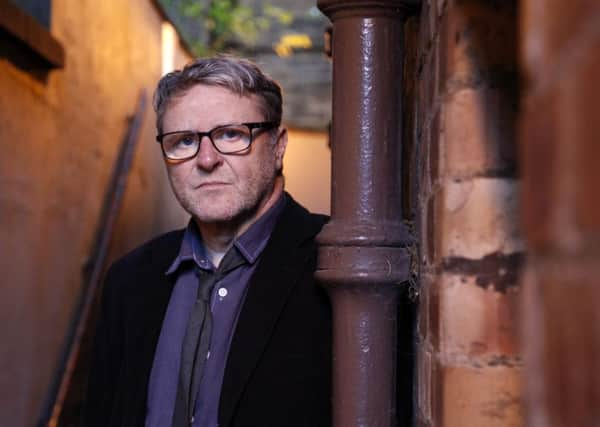Theatre review: Rebus '“ Long Shadows


King’s Theatre, Edinburgh **
It was a desperately sad turn of events, and all Edinburgh, and fans everywhere must wish Lawson the quickest possible recovery. In truth, though, it’s doubtful whether he could have done much, in the remaining 40 minutes of the show, to redeem a theatre event that was hardly striking dramatic sparks at its Edinburgh premier; and the final roar of applause that greeted Lawson’s understudy Neil McKinven - who came on script in hand to complete the show, after playing several minor characters earlier in the play – seemed more to do with the fact that he had risen bravely to a unexpected challenge, than with any other aspect of the show.
In essence, Long Shadows – premiered last month at Birmingham Rep – is a classic late Rebus mystery, in which the retired detective inspector is haunted by memories of past victims whose killers he failed to hunt down, and who can’t resist venturing out into Edinburgh’s criminal underworld in an effort to right past wrongs.
Advertisement
Hide AdWhat we mainly learn from it, though, is that Rankin’s rich sense of Edinburgh as a complete and rapidly changing city going about its business does not easily survive the transition from page to stage; and that Rebus’s intense imagined conversations with past victims look fairly ridiculous when those girls cease to be vividly-described inner voices, and become real actors, marching around the stage demanding their rights, and helping to shift the furniture.
What emerges, with Rankin’s compelling prose largely stripped away, is an over-familiar and often cliched tale of a 1970s-trained cop still sticking to his old values, while recognising that the world has changed; and of an implausibly wicked villain – John Stahl, in glorious form – announcing his Putinesque and Trumpian philosophy of might-is-right from a penthouse flat overlooking the Meadows. The dialogue is heavy on exposition and cop show cliches, the treatment of women – until an absolutely implausible final twist – classic cops-or-victims stuff. And although female co-stars Cathy Tyson, Eleanor House and Dani Heron deliver powerful performances as cop and victims respectively, Robin Lefevre’s production limps to a long-drawn-out conclusion that even Ti Green’s impressively bleak tenement design, and a final brilliant shaft of blood-red light from the late, great lighting designer Chahine Yavroyan, cannot lift above the ordinary.
JOYCE MCMILLAN
King’s Theatre, Edinburgh, until today It was a desperately sad turn of events, and all Edinburgh, and fans everywhere must wish Lawson the quickest possible recovery. In truth, though, it’s doubtful whether he could have done much, in the remaining 40 minutes of the show, to redeem a theatre event that was hardly striking dramatic sparks at its Edinburgh premier; and the final roar of applause that greeted Lawson’s understudy Neil McKinven - who came on script in hand to complete the show, after playing several minor characters earlier in the play – seemed more to do with the fact that he had risen bravely to a unexpected challenge, than with any other aspect of the show.
In essence, Long Shadows – premiered last month at Birmingham Rep – is a classic late Rebus mystery, in which the retired detective inspector is haunted by memories of past victims whose killers he failed to hunt down, and who can’t resist venturing out into Edinburgh’s criminal underworld in an effort to right past wrongs.
What we mainly learn from it, though, is that Rankin’s rich sense of Edinburgh as a complete and rapidly changing city going about its business does not easily survive the transition from page to stage; and that Rebus’s intense imagined conversations with past victims look fairly ridiculous when those girls cease to be vividly-described inner voices, and become real actors, marching around the stage demanding their rights, and helping to shift the furniture.
What emerges, with Rankin’s compelling prose largely stripped away, is an over-familiar and often cliched tale of a 1970s-trained cop still sticking to his old values, while recognising that the world has changed; and of an implausibly wicked villain – John Stahl, in glorious form – announcing his Putinesque and Trumpian philosophy of might-is-right from a penthouse flat overlooking the Meadows. The dialogue is heavy on exposition and cop show cliches, the treatment of women – until an absolutely implausible final twist – classic cops-or-victims stuff. And although female co-stars Cathy Tyson, Eleanor House and Dani Heron deliver powerful performances as cop and victims respectively, Robin Lefevre’s production limps to a long-drawn-out conclusion that even Ti Green’s impressively bleak tenement design, and a final brilliant shaft of blood-red light from the late, great lighting designer Chahine Yavroyan, cannot lift above the ordinary.
JOYCE MCMILLAN
King’s Theatre, Edinburgh, until today